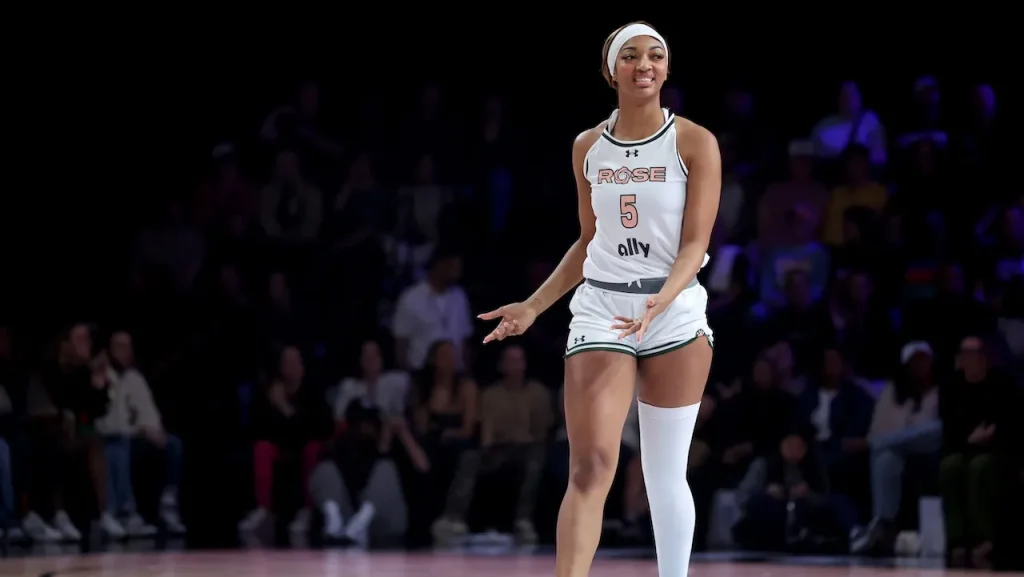Angel Reese, the controversial women’s basketball star, continues to be a lightning rod for both adoration and criticism. Her recent ejection from an Unrivaled league game, the first in the league’s nascent history, further fuels the ongoing debate surrounding her on-court behavior and its broader implications for women’s basketball. The incident, stemming from a foul on Tiffany Hayes followed by an offensive gesture towards a referee and subsequent argument, resulted in two technical fouls and Reese’s removal from the game. Reese’s immediate response on social media, dismissing a Sports Illustrated article covering the ejection as “clickbait,” underscores her perception of being unfairly targeted by media scrutiny, a sentiment she has frequently expressed. This incident adds another layer to the complex narrative surrounding Reese, a player whose undeniable talent is often overshadowed by her controversial actions.
The ejection occurred during a game between Reese’s Rose Basketball Club and the Vinyl Basketball Club, with Rose already struggling at a 1-4 record. The loss of their star player further exacerbated the team’s woes, resulting in a 79-73 defeat, with Vinyl’s Rhyne Howard dominating with 33 points. This latest controversy comes on the heels of Reese’s already tumultuous year, marked by intense scrutiny and criticism stemming from her on-court actions, particularly during the 2023 NCAA women’s basketball championship game. Her “you can’t see me” gesture directed at Caitlin Clark, while celebrating LSU’s victory over Iowa, sparked a national debate about sportsmanship, race, and the double standards often applied to female athletes.
The championship game incident, a pivotal moment in Reese’s career, ignited a firestorm of reactions. While some celebrated her unapologetic display of confidence, others condemned it as unsportsmanlike and disrespectful. Reese herself acknowledges the profound impact of that moment, stating that it “changed my life forever.” She contends that much of the criticism she receives is racially motivated, citing the intense backlash from Iowa and Indiana fans as evidence of this bias. Reese has even gone so far as to allege that some fans have created and distributed AI-generated nude images of her to her family members, a disturbing claim that further highlights the intense and often invasive scrutiny she faces. This incident underscores the darker side of fame in the digital age and the potential for online harassment to escalate into real-world harm.
The rivalry between Reese and Caitlin Clark, which began in the 2023 NCAA championship game, continued into the following season, with Clark and Iowa exacting revenge in the 2024 Elite 8. The emotional toll of the ongoing controversy and online harassment was evident in Reese’s tearful post-game press conference following the loss. Their rivalry extended into the WNBA, where Clark’s Indiana Fever and Reese’s Chicago Sky faced off four times, with Clark’s team winning three of those matchups. These games were also marked by several controversial fouls, including a flagrant-1 on Reese for slamming her arm into Clark’s head. Although Clark declined to join the Unrivaled league, Reese’s ejection demonstrates that her controversial actions persist even without the direct presence of her primary rival.
Reese’s actions, both on and off the court, have sparked a larger conversation about the treatment of female athletes, particularly Black women in sports. She has become a symbol of the double standards often applied to women athletes, who are frequently criticized for displaying the same confidence and swagger that is often celebrated in their male counterparts. Her willingness to express her emotions and celebrate her victories, while criticized by some, has also resonated with many who see her as a powerful and unapologetic representation of Black female athleticism. This complex interplay of race, gender, and athleticism makes Reese a fascinating and polarizing figure in the world of women’s basketball.
The Unrivaled league ejection adds another chapter to Angel Reese’s already complex narrative. While undeniably talented, her continued involvement in controversial incidents raises questions about her maturity and ability to navigate the pressures of professional sports. The incident also highlights the challenges faced by female athletes, who are often subjected to intense scrutiny and held to different standards than their male counterparts. As Reese’s career unfolds, it remains to be seen whether she can channel her passion and talent into consistent on-court success while navigating the turbulent waters of public perception and online scrutiny. Only time will tell if she can learn from these experiences and evolve into the kind of leader and role model that her talent suggests she could be.

